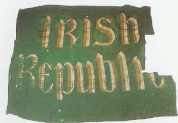There they go again! ‘We must have stable government’ says the political class – more specifically the Labour leadership and the bourgeois press. ‘We need a broad-based government to send a message to our partners in the EU and the international financiers’, they say.
What they mean of course is that Labour must do its ‘duty’ – again. It must, for the Labour leadership, get into power. For the bourgeois press, Labour must prop up the hegemonic right-wing political system, or the sky might fall.
We have had stable government for 14 years, with a minority Fianna Fail government relying either on small parties or a number of compliant independents, so stable that the government was able to bankrupt the country in broad daylight with the assistance of the small parties and independents without any significant protest from them until Black November when the IMF and EU were gifted our sovereignty by that government.
And what of Labour’s claim that its presence in government will make it more ‘broad-based’? A glance at the profile of the Labour TDs elected this time will reveal very few TDs from the working class, self-employed manual workers, small farmers, the unemployed, working mothers, carers, people with disabilities. Oh, but Labour lawyer-TDs, and Labour economist-TDs, and Labour academic-TDs, will, they say, ‘represent’ those people. The truth is that a ‘Labour’ party that does not have a healthy cohort drawn from the working and lower middle class among its parliamentary representatives is just another bourgeois party.
A Fine Gael – Labour coalition would have upwards of 115 seats in the Dail, leaving about 50 seats to the opposition. Such an imbalance, far from being just ‘stable’, would amount to a parliamentary dictatorship, free of the possibility of dismissal from power, and capable of governing without the need for accountability.
It makes no sense to read the voters’ intentions in this election as an endorsement for this sort of ridiculous coalition of Left and Right, particularly when it is obvious that there could be a very stable government formed between Fine Gael and the remaining rump of Fianna Fail, thus really ending Civil War politics. The two parties are in complete ideological agreement, are two sides of the same coin.
A proper reading of the voters’ intentions is to be gauged by the massive increase in support for left-wing parties, which in the mind of the electorate includes the Labour Party, Sinn Fein, The United Left Alliance and leftist independents. Matched by a significant decline in the number of centre-right and right-wing TDs coming out of this election, this is not just an urban phenomenon but is spread around the country.
The appropriate response of the Right to the wishes of the electorate is a coalition of Fine Gael and Fianna Fail, and some in those two parties may already be discussing this option. That would leave us with a powerful opposition, the first left-wing opposition in the history of the State.
This election has been revolutionary in its outcome. It cannot be, for the convenience of a few, turned into a counter-revolution. The next election will be even more important. It will likely take place in 2015 in the run-up to the centenary of 2016, the most appropriate moment to finally create the sort of Republic envisaged by the revolutionaries of 1916. It would be a travesty if the Labour Party, so central to that revolution, should, by its actions in going into government with Fine Gael, ensure that a rejuvenated Fianna Fail and a burgeoning Sinn Fein have their hands on those levers, to the exclusion of the Labour Party.
Labour – listen to the voters. Their intent is clear, that Civil War politics must end, and that we should finally have a democracy mature enough to take seriously the Left as well as the Right. It is called democratic choice!
